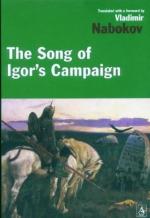|
This section contains 305 words (approx. 1 page at 400 words per page) |

|
The Song of Igor's Campaign Summary & Study Guide Description
The Song of Igor's Campaign Summary & Study Guide includes comprehensive information and analysis to help you understand the book. This study guide contains the following sections:
This detailed literature summary also contains Bibliography on The Song of Igor's Campaign by Anonymous.
The Song of Igor's Campaign is one of the classics of medieval epic literature and the only surviving example of the epic form written in Russia. It was written between 1185 and 1187, shortly after the events it describes took place. The epic relates the unsuccessful expedition of Prince Igor of Novgorod-Seversk, in Russia, against the nomadic tribes known as the Kumans, who had been raiding Russian lands in the southeast. Igor is defeated and captured but he eventually escapes and returns to Russia.
The manuscript of The Song of Igor's Campaign was discovered in 1795 and first published in 1800. The one surviving manuscript was then destroyed in the fire of Moscow in 1812. Fortunately, a copy had been made for Russia's Catherine the Great. However, there are many corrupt passages where the anonymous author's meaning is unclear.
The Song of Igor's Campaign has always been treasured for its literary quality. It is dense with imagery, simile and metaphor, and shows great structural variety. To the tale of Igor's military campaign, the author adds reminiscences of Russia's past. He employs laments, panegyrics (passages which lavishly praise a person), omens and dreams. The Song of Igor's Campaign is also notable for its poetic view of nature, in which animals, vegetation and natural forces react to and even shape the actions of humans. The author's psychological insight into his characters has also been admired.
The major theme of the work is the author's passionate plea for unity amongst the Russian princes, who had a history of feuding among them. The author believes that disunity leads to disaster for Russia. A melancholy feeling therefore pervades the epic. Although the author makes Igor's defeat seems more important than it was historically, his words proved prophetic. Early in the next century Genghis Khan's Mongol army conquered Russia and subjugated it for 200 years.
Read more from the Study Guide
|
This section contains 305 words (approx. 1 page at 400 words per page) |

|



